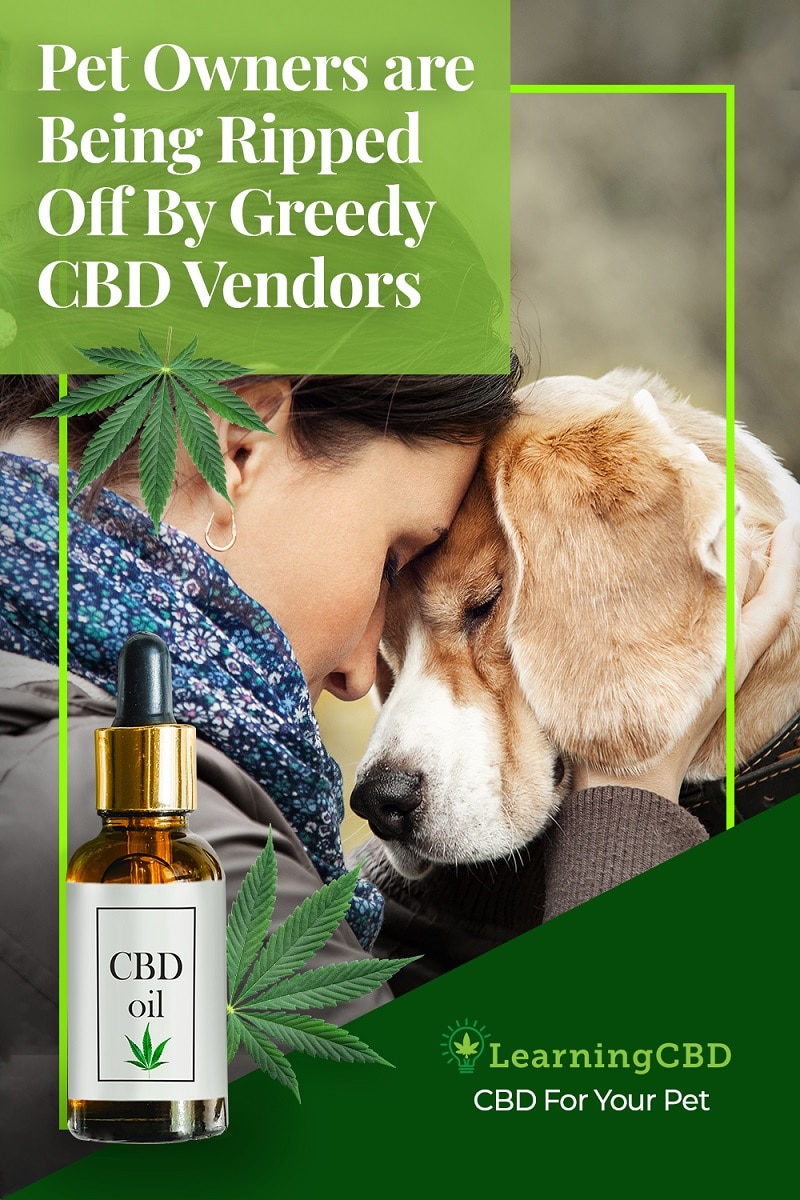Pet Owners are Being Ripped Off By Greedy CBD Vendors. Here’s How You Can Help Your Pet For Real.
When it comes to CBD, there’s good news and bad news. The good news is that the arena is exploding with promise. Numerous studies have come out which demonstrate how CBD can help address numerous physical and emotional issues, including depression, pain, skin disorders and more. Scientific understanding is unquestionably evolving, but the field seems to be filled with hope.
The bad news? CBD has turned into a gold rush for some unscrupulous vendors who don’t care about you or your health and only want to make as much money as possible. As a result, consumers – and especially pet owners – have to be more careful than ever before.
Some Pet CBD Products Barely Contain Any CBD
A new report indicates that, unfortunately, many pet owners are finding themselves ripped off by unscrupulous CBD sellers. According to a report from Foxnews and the Associated Press, repeated analysis of CBD pet products shows that far too many products contain either no CBD or barely any – sometimes as little as 2 milligrams per milliliter.
According to Dr. Joseph Walkshlag, a veterinary researcher at Cornell University, this number should be between 25-75 milligrams per milliliter in order to actually be impactful.
What does this mean? Unfortunately, it means that pet CBD products are no different than those that are geared towards humans: Some are good, and some are utterly worthless.
A University of Pennsylvania study, which took place in 2017, shed light on just how serious this problem was. The study took 84 different CBD products and tested them against their labeling. It found that nearly 70% of the CBD products were mislabeled. This extended to ingredient amounts and whether or not some ingredients were present at all. Most disturbingly, this mislabeling included THC, or tetrahydrocannabinol, the active ingredient in marijuana which can get someone high. This could potentially cause a user significant medical or legal problems.
Based on the analysis of Dr. Walkshlag and the University of Pennsylvania’s study, it appears all too easy for CBD companies to rip off their consumers. Fortunately, there are things which pet owners and people can do to confirm the veracity of the CBD products they purchase.
Can CBD Help Your Pet?
Like CBD and humans, the science on this one is still evolving. Unfortunately, there does seem to be a dearth of research when it comes to CBD and pets specifically. The good news is that many of the studies which have been touted as showing CBD’s benefits for humans also show promise when it comes to pets, as quite a few of those studies actually take place in rats, not just humans. Thus, their findings may be applicable to animals as well.
More good news: Limited research indicates that CBD may be helpful for pets. A July 2018 study found that, when given CBD, dogs with osteoarthritis showed signs of increased comfort and engaged in more activity.
In 2017, sensing the interest in the subject, the American Kennel Club announced that they would be working with the Colorado State University’s College of Veterinary Medicine to study the effects of CBD on epilepsy in dogs. It is worth noting that this is the one area where the United States Food & Drug Administration has approved cannabis-based medication to treat seizures in young children.
That study’s results, released in May 2019, were described as “promising and exciting.” The study was small, only examining 16 dogs, but it found that 89% responded positively to CBD and showed a reduction of seizures.
To be sure, this was a small study. Further research is needed with a larger population in order to replicate these findings. However, it does show hope.
The potential positive benefits of CBD on seizures isn’t the only parallel between human and pet CBD products. As noted by the AP report, countless pet owners rave about the benefits that CBD has had for their pets. However, as the report notes, many questions remain. What is the ideal therapeutic CBD dosage for a pet? What strains work better? How does CBD affect different breeds? Are there any long-term consequences for CBD use?
These are all very important questions that must be answered. However, based on individual experiences, it seems apparent that CBD may help pets, even if the mechanism behind what it can do isn’t fully understood.
What To Do If You Want To Try CBD For Your Pet
There are plenty of pet products out there that claim to contain CBD. However, as an informed consumer who cares more about helping your pet then enriching a CBD vendor, there are two steps you must take.
First and foremost: Talk to your Veterinarian. It is very possible that there will be additional research available which shows how CBD may or may not help your pet, and for what conditions. Furthermore, if your pet has any other illnesses or is on any other medication, your Veterinarian will know and be able to determine if it is safe for your pet to try CBD. CBD does have negative interactions with some drugs in humans, and there is concern that CBD may cause liver damage. As such, it is always better to be safe than sorry.
Second: Only purchase CBD if a Certificate of Analysis is available. A Certificate of Analysis is essentially a lab report done by a third-party vendor, one with no direct affiliation with the CBD seller. A properly conducted Certificate of Analysis will examine the specific batch that the CBD you have been sold comes from. It will then list its various ingredients, including levels of CBD and THC. This will give you the opportunity to examine what is in the CBD you are about to give to your pet. It will also give you the chance to make sure that the chemicals and levels in the CBD are adequate. If you have any specific questions about the chemical content of the CBD, you can always ask your vet for assistance.
Third: Make sure to pay attention to reviews. All other things being equal, it is always better to purchase a product with good reviews than one without any. Understand that these reviews can be faked, and if you are purchasing CBD directly from a company’s website, it is highly likely that the reviews on there will be less than honest. As such, while website comments can be helpful, they can only provide a rough guide. Furthermore, comments on independent websites or places like Amazon can provide additional and more unbiased assistance.
The Good News
Just like in their human companions, available evidence indicates that CBD may be able to provide pets with real assistance. More research is needed, but if you believe that CBD can help your pet, make sure to take the steps above. Some vendors truly don’t care about your animal’s well-being and only want to make a quick buck. Being an aware consumer can help protect your beloved family pet and you from unnecessary pain and heartbreak.
FAQs About CBD For Pets Being A Ripped Off
Question: Can CBD help my pet?
Answer: Many of the studies which have been touted as showing CBD’s benefits for humans also show promise when it comes to pets.
Question: What To Do If You Want To Try CBD For Your Pet?
Answer: Some of the tips to make sure you’re using CBD for your pet correctly is to consult your vet, purchase only in reputable companies and make sure to pay attention to reviews.
Question: Does the FDA approve the use of CBD in some cases?
Answer: There is one study in 2017 where the FDA approved cannabis-based medication to treat seizures in young children.







